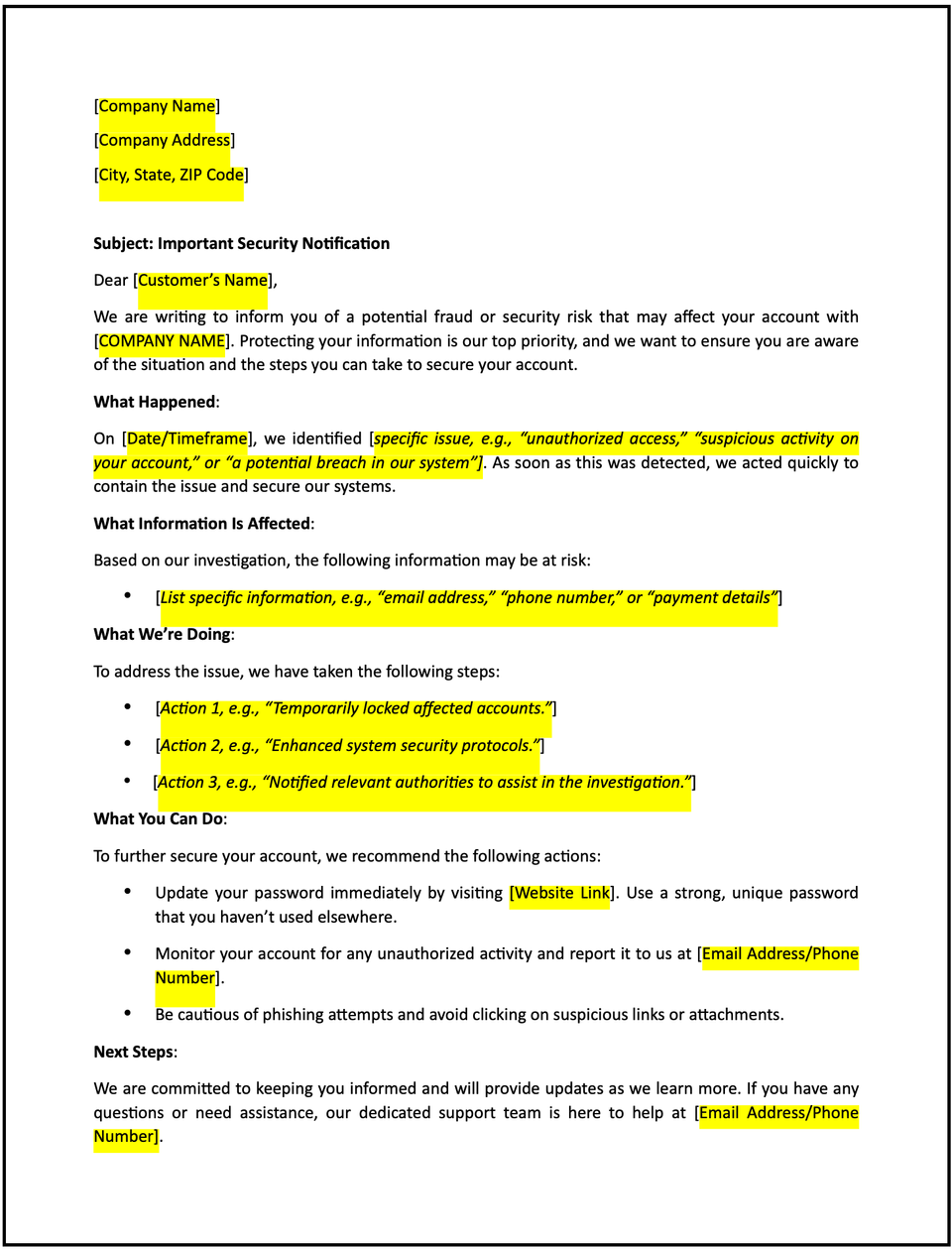Letter notifying customer of fraud or security risk: Free template

Letter notifying customer of fraud or security risk
Notifying a customer of a fraud or security risk is a critical step in protecting their interests and maintaining trust. This letter provides a professional way to inform the customer of the issue, outline immediate actions, and guide them on safeguarding their information.
How to use this letter notifying customer of fraud or security risk
- Open with urgency and empathy: Begin by acknowledging the seriousness of the situation and the potential impact on the customer.
- Describe the issue: Clearly explain the nature of the fraud or security risk, avoiding technical jargon while being transparent.
- Outline immediate actions taken: Summarize the steps your organization has already taken to address the situation and minimize harm.
- Provide customer guidance: Offer clear instructions for the customer to protect their information, such as changing passwords or monitoring accounts.
- Reassure the customer: Emphasize your commitment to resolving the issue and preventing similar risks in the future.
- Provide contact details: Include information for reaching your support team for further assistance or clarification.
- Maintain a professional tone: Ensure the letter is empathetic, respectful, and solution-focused.
Benefits of using a letter notifying customer of fraud or security risk
This letter template ensures a professional and transparent way to notify customers of security risks while maintaining trust and providing actionable guidance. Here’s how it helps:
- Protects customers: Prompt notification allows customers to take immediate action to safeguard their information.
- Reinforces trust: Transparency in communication demonstrates accountability and builds customer confidence.
- Demonstrates professionalism: A well-crafted notification reflects your organization’s commitment to handling risks responsibly.
- Reduces misinformation: Providing clear and accurate information prevents speculation or confusion.
- Strengthens relationships: Showing care and responsiveness fosters loyalty even in challenging situations.
Tips for writing an effective letter notifying customer of fraud or security risk
- Be specific: Clearly describe the nature of the risk, how it was identified, and its potential impact.
- Use clear language: Avoid technical jargon and explain the issue in a way that’s easy for the customer to understand.
- Focus on actions: Highlight what your organization is doing to resolve the issue and what the customer should do next.
- Reassure the customer: Emphasize your commitment to protecting their information and preventing future risks.
- Keep it concise: Focus on the key points without overwhelming the customer with excessive details.
Frequently asked questions (FAQs)
Q: What details should I include in this letter?
A: Include a description of the risk, immediate actions taken, guidance for the customer, and contact information for further support.
Q: Should I apologize in this letter?
A: Yes, a sincere apology demonstrates accountability and care for the customer’s experience.
Q: Who typically receives this letter?
A: Send the letter to all customers potentially affected by the fraud or security risk.
Q: How formal should this letter be?
A: The tone should be professional yet empathetic, focusing on transparency and protecting the customer.
Q: When should this letter be sent?
A: Send the letter as soon as the risk is identified and initial measures have been taken to address it.
Q: Can this letter include preventative advice?
A: Yes, offering guidance on steps the customer can take to protect their information is highly recommended.
Q: Is acknowledgment from the customer required?
A: While not required, encouraging customers to reach out with questions or concerns demonstrates attentiveness.
This article contains general legal information and does not contain legal advice. Cobrief is not a law firm or a substitute for an attorney or law firm. The law is complex and changes often. For legal advice, please ask a lawyer.


